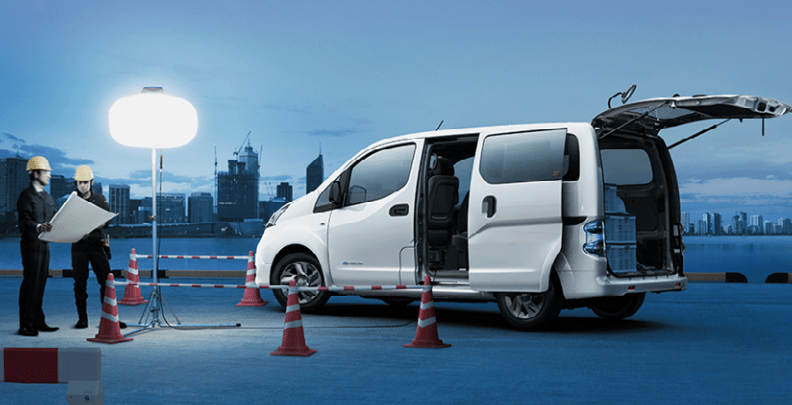Nissan has made progress in the electrification of commercial vehicles, both in vans and in ambulances and pickup trucks.
To put it in perspective: Commercial vehicle sales, which account for 25% of car sales, are estimated to rise to 50% by 2030, so commercial vehicle electrification is important for carbon neutrality.
Since June 2014, Nissan was the first to sell the e-NV200 EV multipurpose commercial van in European countries and Japan.
Compared to commercial vehicles based on internal combustion engines, the e-NV200 can lower running costs and offer superior environmental responsiveness, including considering the impact of noise on the environment.
In addition, the e-NV200 has power outlets in two locations that draw a total of 1500W of electricity from the on-board engine for power generation, which can be used to secure power for business travel, outdoor events and leisure activities, such as for outdoor coolers or camping, as well as a source of power in case of a disaster.
On construction sites, noise problems can be alleviated as there is no need to use an engine-driven generator.
Nissan
In Europe, the company proposes a concept that combines comfort and practicality through self-sufficient electricity with the «e-NV200 Winter Camper concept», which allows the 220-volt battery to be charged using roof-mounted solar panels.
Also, in 2020, the Tokyo Fire Department will start using a zero emission (EV) ambulance based on the NV400.
Because ambulances must reduce physical discomfort for both patients and paramedics, and because they must be equipped with precision medical equipment, Nissan believes that quiet, low-vibration electric vehicles have great merit.
As this vehicle is also equipped with two lithium-ion batteries providing 33 kWh and 8 kWh, it is possible to operate electrical equipment and air conditioners for longer periods of time.
It also allows the ambulance to be used as a mobile power source in the event of a power outage or disaster.
Going forward, Nissan will continue to expand its electric commercial vehicle lineup, including the introduction of next-generation small vans using the Alliance platform, and promote zero-emission commercial vehicle manufacturing.
![]()

